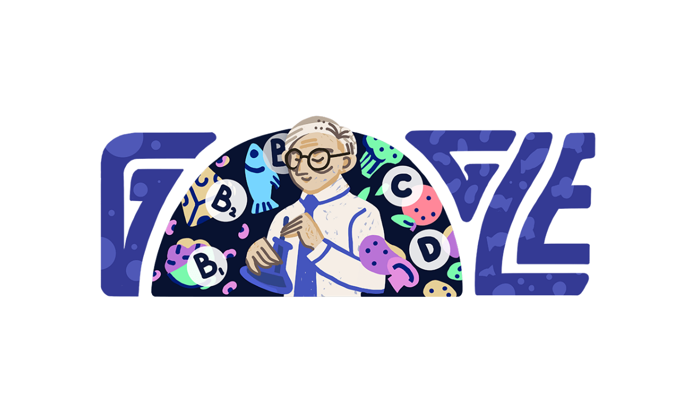Google Doodle celebrates Casimir Funk’s 140th Birthday
Google Doodle took the opportunity of 23 February to celebrate a pioneer in the discovery and formulation of those vitamins and nutrients that are essential to human health

Friday’s Google Doodle commemorated the birthday of Polish-American biochemist Casimir Funk, a person we have to thank for understanding just how important vitamins and nutrients are for human health.
The biologist was among the first to discover and introduce the concept of “vital amines” a groundbreaking scientific discovery that has helped the health of many people and led to the cures of several life-threatening diseases.
The Funk Estate collaborated with Google Doodle on Friday’s art project for the biologist’s 140th birthday. His grandson, Erik Funk, described him as a “remarkable individual whose life left an indelible mark on the field of science”, and alongside his worldwide acclaim, he cherished and was committed to his family and roots.
Kazimierz (Casimir) Funk was born on 23 February 1884 in Warsaw, Poland. Funk’s grandson described him as a curious child who was always eager to discover the world around him, and growing up in Poland, he showed a thirst for knowledge.
After finishing high school, he travelled to Switzerland to study biology and chemistry
At the young age of 20, he received a PhD in organic chemistry from the University of Bern and began working at different research institutions across Europe.
Erik Funk said that his grandfather faced many obstacles as a Jewish student in Europe, at a time when antisemitism was on the rise, yet he pursued his education due to his passion for the subject and earned his doctorate.
Funk became increasingly interested in how food ingredients could have an effect on certain illnesses like scurvy, cancer, pellagra and rickets, to name a few.
In 1911, Funk started to experiment with a substance called B1 (thiamine) and managed to form it into small, ingestible crystals.
These crystals were able to help with the growth and function of various cells. He named his invention vitamines after the Latin word vita, meaning “life” and amine, which is a chemical compound containing an amino group.
This term would later be shortened to – and as we know it – vitamin.
In 1915, Funk made the big move to New York City and became a naturalised American citizen in 1920.
He had a stint in Warsaw before moving to Paris for over a decade, where he became a consultant to a pharmaceutical company and founded Casa Biochemica, but with the outbreak of the Second World War in 1939, Funk returned to the United States, the American Nutrition Association’s website reads.
While he was in the United States, he worked in research positions at universities and eventually went on to serve as a consultant to the US Vitamin Corporation.
The biologist’s dedicated work did not stop there, however, as he continued to discover different vitamins and determined where they were found in different foods.
Funk published his book De Vitamine, after which scientists all over the globe discovered 13 different vitamins over the next 35 years.
“Tragically, Casimir’s life was cut short when he passed away in 1967 in Albany, New York,” Erik Funk said in his Doodle message.
“However, his legacy endures through his groundbreaking discoveries and the countless lives he has touched through his pioneering work in the field of biochemistry and nutrition.”
Erik accepted a Nutrition Hall of Fame award for his late grandfather, which was given to the biologist posthumously.
Join our commenting forum
Join thought-provoking conversations, follow other Independent readers and see their replies
Comments
Bookmark popover
Removed from bookmarks